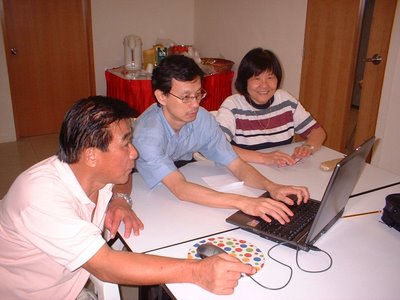Designing Learning Experiences
A record of the experiences of participants in the "Designing Learning Experiences for the Church in the 21st Century" class held at the Singapore Bible College.
Friday, March 31, 2006
Session Two: Animated Gif Projects

Sorry for the rather brain taxing activity put at the end of your day yesterday. I should have let you do some exercises in production, rather in the research. But the idea was to give you an experience which involved research ---> production.
Anyways, below is a link to the map site: Bible.org site

Two other sites you will like include Bible Resource Center and Anova.org
Fire? Click here for fire images
Stick figures? Click here for some animated stick figures. Better still, there is a free program call Pivot Stickfigure Animator which helps you to make stick figures. Here is a write up:
Pivot Stickfigure Animator is a unique software, that allows you to create stick figure animations easily and without any artistic skills. You can move the sections of the sick figure and easily create a chain of animation frames that can be previewed as you go. You can use more than one stick-figure in the animation, and even create your own stick figures using an easy to use visual editor that lets you assemble objects out of lines and circles. In addition, you can optionally set animation size, speed and more. The result can be saved as animated GIF file. Fun and easy to use, surprisingly well featured.
Finally, you can create some nice words using fancy fonts at http://www.3dtextmaker.com/
Here is a sample:

Wednesday, March 29, 2006
Thursday, March 23, 2006
Session One: Intro and Creating visual content using UnFREEz
The focus of this session was to use an animated gif maker software called UnFREEz to make visual content. If you look carefully at how the name is spelt, you will notice that the emphasis in the name is on the word "FREE". That's right, the software can be downloaded for free.
But what are animated gifs? Here is a definition of what animated gifs are which is provided by PCMagazine.com.
Two things I would like you to remember when creating animated gifs.
1) The image files you use must be in .gif format. JPG, TIFF, PNG, PSD, etc. formats will not work.
2) All images need to be of the same size. It is for this reason that I would recommend that when your images are of unequal size, embed them in Powerpoint, save the slides in .gif format, and then upload your identical sized images into UnFREEz.
Click here to see a sample of very simple content created by me. Remember if an old guy like me can do it, so can you!
Welcome to hours of creative fun.
Wednesday, March 22, 2006
Syllabus for Part 2
OK. Here's what we will be working on in this course:
Session One (23 March)
a) Restating our vision and our goals in Christian Education
b) From theory into practice; using UnFREEz and Powerpoint to create visual content
Session Two (30 March)
Using UnFREEz and Powerpoint for designing learning experiences
Session Three (6 April)
Introduction to Web Generators and other online resources
Maundy Thursday (13 April)
No class. Click here for substitute.
Session Four (20 April)
Introduction to online learning spaces: Blogger.com, multiply.com, tapped-in.org, Nicenet.org, as well as online sites which can host the visual and audio content created.
Session Five (27 April)
Designing and enabling community learning in online learning spaces; community blogging, instant messaging, Voice over IP, video conferencing, etc.
Session Six(4 May)
Introduction to Webquest learning experiences
Session Seven (11 May)
Designing webquest for learning in the church using the Introduction-Task_Resource_process-Evaluation-Conclusion template.
Welcome to the course!
Welcome to the Designing Learning Experiences for the Church in the 21st C (Pt 2) course. This second part will see alot more use of educational technology and whole host of Internet resources out there.
We live in a world in which the Internet has pervasive presence. That being so, a lot of the teaching learning functions can be extended beyond the traditional learning spaces. What is more, computers and the Internet offers what is called unique "affordances," the enabling as well as limiting properties that are perceived and experiences in the online learning environment.
Some of these enabling abilities, and connections to a host of resources will be explored in this class, with the goal of being familiar enough with them to design learning experiences using tools and resources in the virtual world to shape the minds and hearts of the church.
I trust that our time will be fruitful.
Mr Chong


